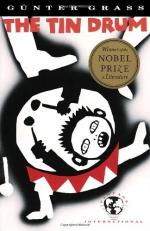|
|
The Tin Drum Chapter 5: Smash a Little Windowpane
Oskar opens by saying that the first thing made plain to him was that grownups were incapable of understanding him. He relates the story of his third birthday. Jan watched Agnes play the piano, while Anna, Hedwig, and Alexander Scheffler sat with Greff and listened to Boy Scout stories. Matzerath was busy cooking. Oskar, beating on his new drum, wandered into the adjoining grocery store and found the trap door to the cellar open, Matzerath having forgotten to close it. Oskar says he realized what the door demanded of him - not suicide, but sacrifice. He walked down the sixteen stairs, placing his drum in among the sacks of flour so as not to damage it. Then he walked up to the ninth stair and threw himself off, landing headfirst on the concrete floor. The clatter of broken glass brought everyone running.
Agnes blamed the fall on Matzerath - she screamed and flailed at him while they called the doctor. Oskar says that by falling intentionally down those stairs, he gave a reason, confirmed by the doctors and thus accepted by the grownups, for his not growing. In addition, he unintentionally made Matzerath a guilty man, blamed forever by his wife.
Once home from four weeks in the hospital, Oskar began to drum, keeping his drum with him at all times. At the same time, he developed a voice that was so high-pitched that he could break any piece of glass. He used this voice to keep the drum whenever a grownup tried to take it away. When the neighborhood children learned of this, they began to make fun of him by singing jingles. Like the Pied Piper, Oskar would drum along with the song and the children would follow him.
Oskar drummed until he wore a hole in the drum's top surface; it became jagged and sharp, and little shreds of metal fell inside and began to jingle. Instead of giving Oskar a new drum, however, the grownups wanted to take the current one away from him; his mother tried to bribe him with silly things like chocolate, while Matzerath yanked the drum away. Oskar responded with his first glass-breaking scream. The glass face of the grandfather clock in the living room exploded, but the clock's mechanism was unharmed and kept ticking. The grownups were taken aback; Oskar says he believes that Jan Bronski began to pray, but that the Lord didn't say a thing. Oskar then muses:
"What, after all, is a clock? Without your grownup it is nothing. It is the grownup who winds it, who sets it back or ahead, who takes it tot he watchmaker to be checked, cleaned, and when necessary repaired. Just as with the cuckoo that stops calling too soon, just as with upset saltcellars, spiders seen in the morning, black cats on the left, the oil portrait of Uncle that falls off the wall because the nail has come loose in the plaster, just as in a mirror, grownups see more in and behind a clock than any clock can justify." Chapter 5, pg. 67
From that moment on, Oskar says he broke only light bulbs if he could, as he is a lover of fine glassware. For his fourth birthday he received no drum, and broke several light bulbs when the grownups tried to take his rusty drum away, plunging the room into darkness. Immediately Oskar's Grandmother Koljaiczek went to get candles, but in the darkness the intoxicated grownups paired off, Agnes with Jan, Alexander Scheffler with Lina Greff, and Matzerath with Gretchen Scheffler. Hedwig Bronski sat alone, but sang a Boy Scout song duet with Albrecht Greff. Oskar sat under the table, drumming. Anna Koljaiczek came back with the candles and reproached everyone for their sexual debauchery. They began to play skat, which Jan Bronski lost because instead of paying attention, he had taken off his shoe and had his foot up Agnes' dress under the table. The next day Jan Bronski came and exchanged the sailboat he had given Oskar for a new drum.
By Oskar's fifth birthday, it was obvious to his family that he would not grow. He began weekly visits to the doctor. This is the beginning of Oskar's fascination with nurses. When at one point the doctor tried to take Oscar's drum away, he destroyed the doctor's collection of biological specimens in jars. The doctor then published an article in a medical journal about the phenomenon. Oskar balks at how irrelevant it is; he has no real respect for doctors. Later, in the mental institution, Oskar is unable to break any glass at all, but likes to think back to when at first he broke glass only when necessary, then to later, when he broke glass out of playfulness, becoming, as he says, "a devotee of art for art's sake."




